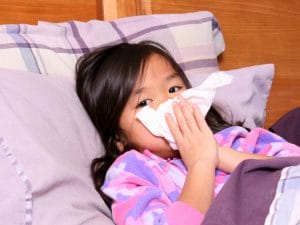 Photo: Getty
Photo: Getty Q: When should a parent suspect a child has allergic rhinitis as opposed to just a persistent cold?
Dr. Bassett: Allergies do share many symptoms with the common cold, but rhinitis has some telltale signs.
A major clue to indicate your child has seasonal or indoor allergies is a strong family history. In a child with allergic rhinitis, a pattern or association of exposure to known allergic triggers (such as pollens, molds, pet dander) is usually seen to result in itchy, watery eyes, sneezing and congested nasal passages.
These symptoms also tend to persist for longer than eight to 10 days, while a common cold typically subsides within one week.
If the nasal symptoms are accompanied by a persistent cough that worsens at night and with activity, you can suspect postnasal drip from allergic rhinitis.
Coughing related to colds tends to occur intermittently throughout the day, is often accompanied by a mild fever and yellow discharge from the nose, and it usually abates the other cold symptoms resolve.
Finally, a successful response to “allergy” medication is a telltale sign that you are dealing with allergies.
Dr. Clifford Bassett, allergist and asthma specialist, is the Medical Director of Allergy & Asthma Care of New York (Allergyreliefnyc.com; Twitter @allergyreliefny). He is on the faculty of NYU School of Medicine and Weill Cornell Medical College and is the author of The New Allergy Solution: Supercharge Resistance, Slash Medication, Stop Suffering.
Submit a Question View all posts by this medical expert.


